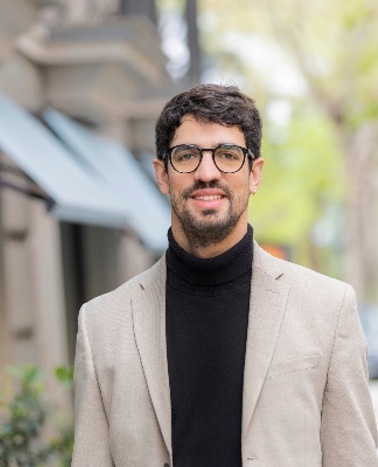
Vicente Valentim
I’m Vicente Valentim, a political scientist from Portugal. I began my academic journey by studying music and have a Bachelor of Arts in Jazz Piano. Afterward, I switched to political science, where I pursued a master’s degree in Lisbon and, subsequently, a PhD in Italy. After finishing my doctorate studies, I moved to Oxford, where I was a Postdoctoral Prize Research Fellow before joining IE University. Although I no longer do it professionally, I am still a big music fan. I also like sports and traveling in my free time.
"For me, the most exciting part about doing research is that one can study interesting questions in great detail."
Studying democratic norms and the rise of the radical right
From a young age, Vicente Valentim wanted to understand politics. His high school teacher was the first person to recognize this interest, and he introduced Vicente to important political texts that sparked a lifelong passion for the field.
However, Vicente was excited to explore other paths before deciding on a long-term career. His love for music shone during his undergraduate years when he earned his bachelor’s degree in Jazz Piano. While Vicente flourished in the program, he soon made the switch to political science—a choice that has defined his professional life.
Dedicating himself to political science was an easy choice as it allowed Vicente to pursue his dream. But it also meant moving out of his native Portugal for his master’s degree and PhD, which took him to Florence in Italy and Oxford in the UK, respectively. After completing a competitive postdoctoral research fellowship, Vicente decided to pull up roots once again, this time joining IE University in Madrid as an assistant professor at IE School of Politics, Economics & Global Affairs.
"I’m very excited about how dynamic IE University is," says Vicente, adding, "It has attracted a number of great scholars." Vicente has established himself as a skilled, innovative researcher and a successful author who has been published in leading academic journals, such as the Journal of Politics, British Journal of Political Science and Elgar Encyclopedia of Political Sociology, among others. The chance to work with globally renowned academics and influential scholars appealed to him greatly.
Additionally, he hopes to advance his own research and believes that being in IE University’s ever-growing and fast-paced environment will be beneficial. "The most exciting part about research is that one can study interesting questions in great detail." For Vicente, these questions include: What do democratic citizens think is acceptable? Why do they think that? And lastly, what is "acceptable" change?
“I’ve always been quite passionate about understanding politics.”
These queries have guided Vicente’s research since he started his graduate studies. They also strongly influenced his book, "The Normalization of the Radical Right: A Norms Theory of Political Supply and Demand." As radical-right parties pop up in more and more Western democracies, Vicente analyses the factors driving this popularity in his bestselling book. "We think of this as an indication that citizens are becoming more radical right," he explains, "but we know from previous research in the social sciences that people’s political views—their attitudes or preferences—do not change very fast, certainly not as fast as the growth in these parties. This is the puzzle that I try to address in the book."
During his book launch, critics and peers agreed that Vicente effectively achieved this goal. He argues that people with radical-right views exist in society but often keep these beliefs private due to fear of judgment or social repercussions. However, in recent years, cunning political entrepreneurs have exploited this divisive ideology to expand their platforms. "This makes radical-right behavior be regarded as more acceptable and, as a consequence, more citizens engage in it and more politicians join radical-right parties," Vicente explains.
His main motivation in writing this book was to expand on arguments he had consistently made in his academic papers. "I wanted to deviate from previous work by highlighting social norm change as a crucial driver of political behavior, and I thought that a book was the best avenue to make that type of broader theoretical case."
More importantly, he longed to start a conversation relevant to today’s global political landscape. "Understanding the rise of the radical right is a crucial political question of the current times," he says. "I hope my book explains this phenomenon and sparks debate on why citizens act the way they do, challenging common assumptions by highlighting that people’s behavior can change even if their views do not."
Vicente still has many unanswered questions on this subject. He notes, "The more I work on this topic of democratic norms, the more I realize is left unanswered." This opens up many more avenues for potential research. He also intends to continue his work in several areas, including the mechanisms that maintain political norms and the stigmatization of political ideologies. Alongside researcher and co-author Amalia Álvarez-Benjumea, Vicente aims to continue studying the process behind changing perceptions through social sanctions. "I’m happy to be at IE University, a place that’s growing and moving fast."